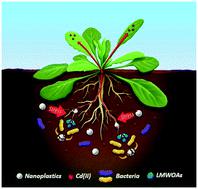当前位置:
X-MOL 学术
›
Environ. Sci.: Nano
›
论文详情
Our official English website, www.x-mol.net, welcomes your feedback! (Note: you will need to create a separate account there.)
Fragmentation of nanoplastics driven by plant–microbe rhizosphere interaction during abiotic stress combination
Environmental Science: Nano ( IF 5.8 ) Pub Date : 2021-08-26 , DOI: 10.1039/d1en00230a Hakwon Yoon 1, 2 , Jun-Tae Kim 3 , Yoon-Seok Chang 1, 4 , Eun-Ju Kim 5
Environmental Science: Nano ( IF 5.8 ) Pub Date : 2021-08-26 , DOI: 10.1039/d1en00230a Hakwon Yoon 1, 2 , Jun-Tae Kim 3 , Yoon-Seok Chang 1, 4 , Eun-Ju Kim 5
Affiliation

|
Large amounts of micro- and nanoplastics, which are released into the environment through environmental weathering of plastic items or sludge disposal/application, can end up in soil, being considered as a new plant abiotic stressor. In nature, plants face a number of abiotic stresses simultaneously. However, it is largely unknown whether and how abiotic stress combination affects the plant uptake of nanoplastics, and how plants tune the rhizosphere interactions to acclimate to a combination of nanoplastic and another abiotic stress. Here we show that smaller, fragmented nanoplastics can accumulate in the root of Arabidopsis thaliana under combined nanoplastic and Cd stresses. The specific changes in root exudation of organic acids and bacterial community composition that reveals a metabolic preference for aromatic compounds drive the degradation of nanoplastics in the rhizosphere. Our findings provide critical implications relevant to food security that nanoplastics will contaminate crops as well, and in turn, transfer along the human food chain.
中文翻译:

非生物胁迫组合过程中由植物-微生物根际相互作用驱动的纳米塑料碎裂
通过塑料制品的环境风化或污泥处置/应用释放到环境中的大量微塑料和纳米塑料最终会进入土壤,被认为是一种新的植物非生物压力源。在自然界中,植物同时面临许多非生物胁迫。然而,目前尚不清楚非生物胁迫组合是否以及如何影响植物对纳米塑料的吸收,以及植物如何调节根际相互作用以适应纳米塑料和另一种非生物胁迫的组合。在这里,我们表明较小的、碎片化的纳米塑料可以在拟南芥的根部积累在复合纳米塑料和 Cd 应力下。有机酸根系分泌物和细菌群落组成的特定变化揭示了对芳香族化合物的代谢偏好,推动了根际纳米塑料的降解。我们的研究结果提供了与粮食安全相关的重要意义,即纳米塑料也会污染作物,进而沿人类食物链转移。
更新日期:2021-09-01
中文翻译:

非生物胁迫组合过程中由植物-微生物根际相互作用驱动的纳米塑料碎裂
通过塑料制品的环境风化或污泥处置/应用释放到环境中的大量微塑料和纳米塑料最终会进入土壤,被认为是一种新的植物非生物压力源。在自然界中,植物同时面临许多非生物胁迫。然而,目前尚不清楚非生物胁迫组合是否以及如何影响植物对纳米塑料的吸收,以及植物如何调节根际相互作用以适应纳米塑料和另一种非生物胁迫的组合。在这里,我们表明较小的、碎片化的纳米塑料可以在拟南芥的根部积累在复合纳米塑料和 Cd 应力下。有机酸根系分泌物和细菌群落组成的特定变化揭示了对芳香族化合物的代谢偏好,推动了根际纳米塑料的降解。我们的研究结果提供了与粮食安全相关的重要意义,即纳米塑料也会污染作物,进而沿人类食物链转移。











































 京公网安备 11010802027423号
京公网安备 11010802027423号